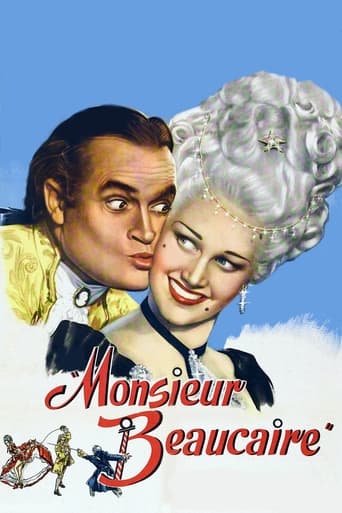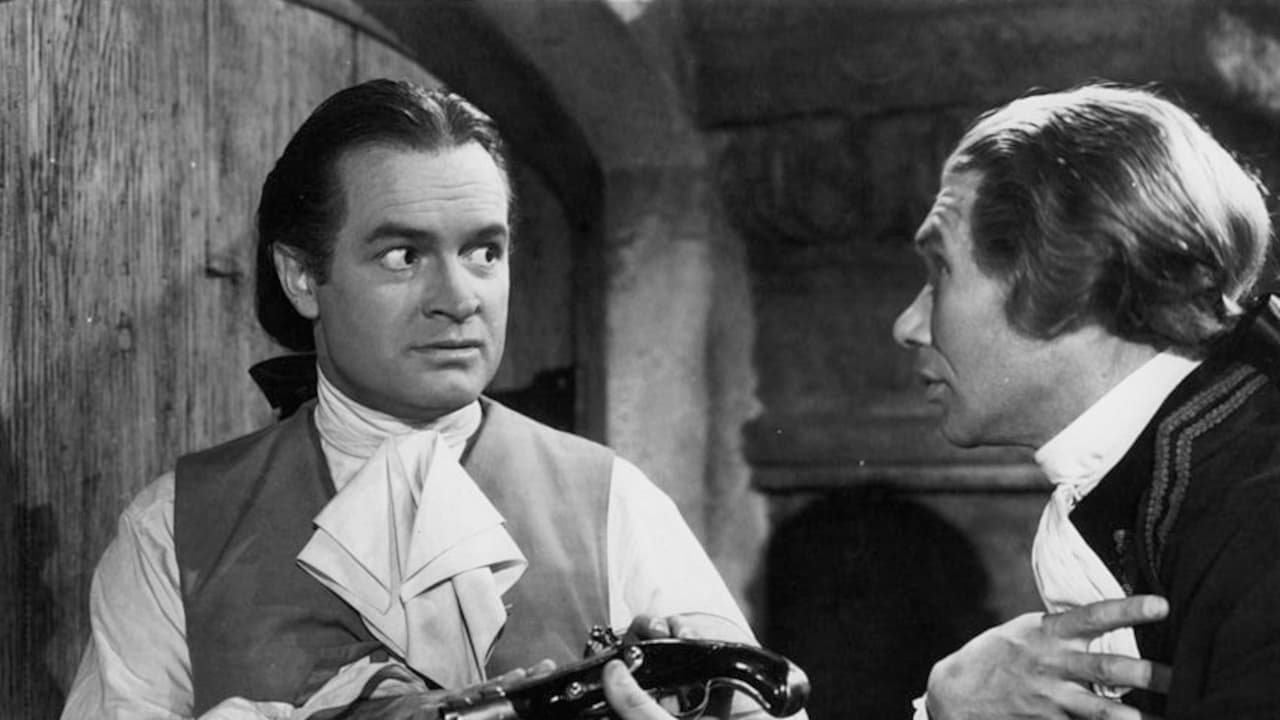csteidler
Bob Hope traipses up the palace gallery to be presented to the king—he is posing as a duke. Using a lorgnette, he can't see where he's going, and he gradually veers off to one side and stumbles into a lady kneeling on the floor and tumbles over her, knocking down about three other people
.It's a ridiculously funny sequence.Hope is Beaucaire, a court barber in costume-era France. He gets mixed up in court politics and intrigue; poses as the Duc le Chandre, renowned lover and duelist; and chases after his girlfriend Mimi—who may or may not reciprocate his romantic feelings but certainly has adventures of her own. The entire cast is lively and beautiful in this very funny picture. Joan Caulfield as Mimi is bright, charming and silly; Marjorie Reynolds as a Spanish princess is lovely. Patric Knowles is dashing enough as the notorious duke—he is the perfect choice (King Louis thinks) to be shipped off to marry said Spanish princess, not only for political reasons but because all the "young bloods" in Paris will be happy to be rid of him. Cecil Kellaway is the harried count whose difficult duty it is to transport the reluctant duke to the arranged wedding site. Reginald Owen is hilariously un-regal as King Louis, and owns every scene he is in. Other highlights include a goofy palace swordfight between Hope and villain Joseph Schildkraut that involves a harp, a bass fiddle, and a harpsichord. Funny and fast-paced
.A couple of decent songs and the usual assortment of Hope one-liners add up to a very enjoyable picture.
MartinHafer
Bob Hope movies of the 1930s and 40s are all very pleasant entertainment, though for comedies the laughs are usually not as obvious or often as you might find in many comedies of the era. This isn't necessarily a bad thing, as the films are a bit more plot-driven than many comedies and in general these films have held up much better than his later films (particularly those from the 1960s). However, I noticed one reviewer gave this one a 10 and suggested Hope should have received Oscar consideration for this film....yeah, right. They're not THAT good! The film finds Bob playing a barber in the latter portion of Louis XV's reign (about 1770 more or less). Naturally Bob is a bit of a screw up and gets in trouble. But, there is a way out--he has to agree to pose as the Duke--a man who is to marry the Spanish princess and solidify an alliance between the countries. But, no one realizes that a crazy Spanish general (Joseph Schildkraut) has plans to kill the Duke, as he WANTS the countries at war with each other! So, it's up to the cowardly Hope to try to save his butt and, hopefully, find love. As for the Duke (Patric Knowles), he's fallen in love with a woman and doesn't really want to marry a princess he's never met. Can it all work out in the end and everyone live happily ever after? The movie is relatively low on laughs--particularly the climactic sword-fighting scene (it's rather lame). But, Hope is an agreeable personality in the film and that makes up for the problems...which would include the3 fact that NONE of the French or Spanish people looked or talked like they came from these countries. Heck, Schildkraut was Austrian and sounded NOTHING like a Spaniard! And Hope seemed about as French as Nelson Mandella! Still, a nice and agreeable little film.By the way, the original "Monsieur Beaucaire" was a silent film starring Rudolph Valentino and was not a comedy. Also, although this is only of interest to history teachers, the film talked about the guillotine several times, though it was not used for the first time until about 1791--during the French Revolution.
bkoganbing
Some current film fans with a perfunctory knowledge of cinema stars of the past will be shocked to learn that Rudolph Valentino and Bob Hope played the same title role in two different versions of Booth Tarkington's Monsieur Beaucaire. Of course you can believe there's a vast difference in the version.The Valentino version is a straight dramatic part about a Parisian barber in the court of Louis XV pretending to be a nobleman. Rudy was at his most romantic in the role and it was one of his biggest hits in the Twenties.Bob Hope's Monsieur Beaucaire finds Bob as a barber at Versailles in the court of Louis XV and worried about the romantic intentions of his sweetheart, scullery maid Joan Caulfield. Cole Porter wrote it best that Caulfield is true to Hope in her fashion, but she's an ambitious girl who knows what it takes to get ahead in the court. She aspires to be Madame Pompadour who is played here by Hillary Brooke.Due to a set of circumstances way too complex to write about, Hope and Caulfield both get themselves banished, mainly because of Hope's fantasies and both get themselves involved in the politics between France and Spain where a royal marriage is being arranged to the dismay of both participants, Marjorie Reynolds for the Spanish and Patric Knowles for the French.Playing the puppet-master in all the intrigue is Joseph Schildkraut who shows a real flair for comedy. His final duel with Hope ranks right up there with one Hope engaged in with Basil Rathbone in Cassanova's Big Night. Rounding out a wonderful cast of supporting players are Howard Freeman as the King of Spain and Reginald Owen and Constance Collier as the King and Queen of France. You don't doubt why Louis has Madame Pompadour around when you take one look at the Queen. By the way Joseph Schildkraut comes to one of the most satisfying ends a villain ever got in film. You'll have to see Monsieur Beaucaire and laugh all the way through to see what happens.
rsoonsa
A "costume comedy" of the sort occasionally essayed by Bob Hope, this "version" of the Booth Tarkington novel is meant as a pastiche of the 1924 Rudolph Valentino film, but the one-liner master extraordinaire and his favourite scriptors, Melvin Frank and Norman Panama, can not resist going their own way, and a comically winning tangent it is. Splendidly directed by George Marshall, with top-flight cinematography and editing by Lionel Lindon and Arthur Schmidt, respectively, the action unfolds in the royal courts of 18th century France and Spain, nations on the verge of war. As the barber for King Louis XV (Reginald Owen), Beaucaire (Hope) finds himself in a situation where he must impersonate a nobleman, the Duc Le Chandre, or lose his head, whereas in the Tarkington original his impersonation is clearly of his own choosing. Meantime, in Madrid, conniving Don Francisco, commander-in-chief of the Spanish army, desires to prevent the upcoming marriage of the actual Le Chandre (Patric Knowles) with Spanish Princess Maria (Margaret Lindsay), by assassination if necessary, in order to destabilize the crown, leading to armed hostilities between the neighbouring countries and an opportunity for him to organize a coup. The false Duke, Beaucaire, becomes the prospective victim of this homicidal chicanery and we view him at his wedding ceremony where desperate measures must be taken to avoid being captured and then killed in quick succession. Hope's gags are beyond counting, some of them quite funny and all featuring his perfect timing, and a scene at the Spanish court that satirizes the use of the lorgnette by the nobility is classic, while there is pulchritude galore with three excellent actresses: Joan Caulfield as Beaucaire's true love Mimi, Hillary Brooke as Mme. Pompadour, and the lovely Lindsay, given her first role since Paramount picked up her contract. Also to be commended for their sharp performances in this fast-moving frolic are the swashbuckling Knowles, Schildkraut, Owen, Cecil Kellaway and Constance Collier, while Hope is supported for the first time by songs from Ray Evans and Jay Livingston, contributors to 11 subsequent films by the comedian, whose work here was Woody Allen's inspiration for the latter's LOVE AND DEATH.


 AD
AD



